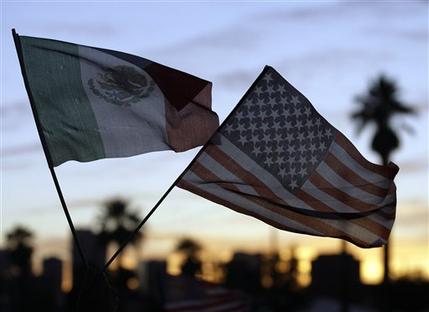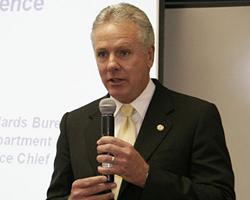Reporting from Mesa, Arizona .As a candidate for president, Republican John McCain lamented his party’s tough talk on illegal immigration. “In the long term, if you alienate the Hispanics, you’ll pay a heavy price,” he told a group of Milwaukee businessmen in October 2006.Back then, some strongly favored walling off the U.S. Mexico border to address the problem, but not McCain. “I think the fence is least effective,” the Arizona senator said.
Lately, however, McCain has transformed himself from a champion of broadbased reform — who spoke of illegal immigrants as “God’s children,” deserving of love and compassion — into a fierce advocate for the kind of crackdown he once scorned.In a recent TV ad, McCain blamed illegal immigrants for all manner of problems facing his state: “smuggling, home invasions, murder.” It is time, he said, for Washington to “complete the danged fence.”Facing his toughest reelection fight in years, McCain’s future may hinge on whether voters see him as honest or opportunistic.
Old allies are dismayed. “Someone who was a visionary … has gone from being very large to very, very small,” said Rep. Luis V. Gutierrez (DIll.), who worked with McCain and the late Massachusetts Democratic Sen. Edward M. Kennedy on a bipartisan immigration overhaul bill.Old foes are dismissive. Among them is former Rep. J.D. Hayworth, McCain’s main rival in the August primary and a longtime adversary. “An electionyear conversion,” Hayworth said.
The more important verdict, however, rests with voters like Linda StapleyWilliams, 60, a retired high school teacher and GOP activist in Mesa. She wonders: “Did he change his position as he was exposed to new information? Because that can be an admirable thing. Or did he change his opinion because the outcry was so overwhelming and there was no way he was going to get reelected if he didn’t?”
McCain — who holds a comfortable, if not overwhelming, lead in polls — declined to be interviewed. Last month he told the Arizona Republic it was “a political ploy” to say he changed his immigration stance.For years, McCain criticized Washington for failing to control the border, pushed for stiffer law enforcement and worked to pry federal dollars loose to help Arizona pay the costs of illegal immigration. But that was only part of the solution, he said many times.
“Congress cannot take a piecemeal approach to a national security crisis,” McCain said in a Senate floor speech in September 2006. “I believe the only way to truly secure our border and protect our nation is through the enactment of comprehensive immigration reform.”Working with Democrats, McCain introduced an enforcement bill in 2005 that included a guestworker program and a provision allowing citizenship for illegal immigrants who learned English, paid a fine, underwent background checks and waited several years before seeking permanent residence.
The legislation was strongly backed by President George W. Bush and passed the Senate with bipartisan support. But the measure drew fierce criticism from grassroots Republicans angry at what they considered amnesty. The bill was killed in the House.Even so, McCain’s coauthorship continues to antagonize many back home.
On a recent hot afternoon, a group of seven GOP women gathered in Mesa over cold drinks to talk about McCain. All were pleased with his harder line, including support for Arizona’s stringent new law against illegal immigration — though some found him more believable than others. None would consider voting for McCain had he not repudiated the 2005 immigration bill.”That’s a dealbreaker,” said Sharon Giese, 63, one of two Arizona representatives on the Republican National Committee. Others nodded.
Mesa typifies the changes in Arizona over the last decade or so, with its explosive growth and influx of Latinos. Once a faroff satellite of Phoenix, Mesa has become the state’s thirdmost populous city, with about 460,000 residents. (That’s more than Cleveland or Miami.)Much of the community has the feel of an upscale oasis. Broad streets, laid out in the grid pattern favored by Mesa’s Mormon founders, are lined with tidy subdivisions and earthtoned shopping centers, a cool mist drifting from the redtile rooftops.
But the heavily Latino neighborhoods near downtown show all the signs of incipient urban decay: empty homes, slashes of graffiti, bars on windows, weeds poking through cracked sidewalks.Since taking a harder line on illegal immigration, the Arizona senator’s future may hinge on whether voters see him as honest or opportunistic.Mesa’s Latino population soared over the last decade, three times faster than the total population, to more than 115,000 residents. Today, 1 in 4 people living in Mesa is Latino, up from 1 in 5 in 2000, according to Tony Sissons, a Phoenix demographics expert.But the Republican women were adamant their support for tough border enforcement has nothing to do with race. Rather, they said, it has everything to do with following the law.
“I feel for the people in Mexico because I know they want the best for the families,” said Heather Sandstrom, 52, a retired TV newscaster. “I think it’s great if they want to immigrate here…. We’d love to have you. But do it legally.”McCain used to say the same thing. In recent months, however, he has made the kind of provocative statements he once condemned. Instead of lamenting the “human tragedy” of illegal bordercrossers dying in the desert, as he did in 2008, he accuses undocumented foreigners of deliberately crashing into other cars — apparently so they can flee when pursuing officers stop to tend accident victims.
“Arizona is under siege in many respects,” McCain said in a recent Fox News appearance. “We have broken borders. We have people flooding across. We have drug cartels inflicting incredible damage.”In fact, statistics suggest that Arizona is safer than it was in the 1990s, when the tide of illegal immigration began to surge. New FBI figures rate Phoenix as one of the four safest big cities in America. From 2008 to 2009, data show, violent and property crimes fell nearly 9% in Mesa and surrounding suburbs.
For many, however, the numbers don’t compute; the news is filled with crime stories linked to suspected illegal immigration or drug trafficking: the killing of a cattle rancher near the Mexico border, the shooting of a sheriff’s deputy in Pinal County.
The Republican women lamented the changes they have seen over the last few years: more day laborers hustling on more street corners, schools increasingly burdened by children who can’t speak English, hospitals filled with illegal immigrants receiving free medical care.”It’s just not fair,” said retiree Carol Jacobsen, 71, who moved to Arizona from the Midwest in 2001. “They’re getting a free ride.”
In 2007, McCain and Kennedy tried to reach agreement on a new immigration bill. By then, McCain was seeking the GOP presidential nomination and being pummeled for his immigration stance; his campaign nearly collapsed that summer, about the same time overhaul efforts died on Capitol Hill.Although McCain rallied to win the nomination, the outcry convinced him that border security had to be addressed before other steps could be considered.
Some who worked with McCain on comprehensive legislation hope he will resume talks once the election is past. (Assuming he wins.) “I don’t think this has staying power with him, mentally or in his heart,” Gutierrez said of McCain’s current position.
That’s what worries Son Hee Williamson, who emigrated legally, she stresses from South Korea nearly 40 years ago. She likes the senator’s tougher approach to illegal immigration. “But I don’t know if he’s going to keep that promise” if reelected, the GOP activist said.She is still deciding who to support in August.




